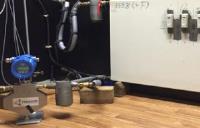 Add My Company
Add My Company
Sign In
Calibration of a thermotechnical test stand
31-01-2019

APPLICATION The Thermotechnical Institute (WTI) of the Mannheim University of Applied Sciences is one of three centres of expertise in Germany appointed for the type approval and DIN testing of heating cost allocators (according to Section 5 of the Heating Costs Ordinance). Measurements for approvals are taken under highly constant thermal conditions using a specifically designed test stand. The specimens (heating cost allocators) are mounted on a radiator. Hot water is circulated through the radiator. The supply and return temperature, as well as the mass flow and volume flow of the hot water, have to be measured with high accuracy. A permanently installed external device is used for measuring the volume flow according to the Coriolis principle.
TECHNICAL DATA
Medium Hot water
Temperature 68-194 °F (20-90 °C)
Pressure 1.5-15 psi (0.1-1 bar)
Measurement range 5-200 l/h
PRODUCT A TRICOR Coriolis Mass Flow Meter TCM 0325 for liquids and gases.
CHALLENGE For accreditation as an internationally recognized test laboratory according to DIN EN 17025, the flow meter that is used has to be calibrated using a DAkkS calibrated measurement standard; a relatively low flow rate has to be measured as accurately as possible over a wide range of 5 to 200 litres per hour. Since the hot water contains suspended matter in the form of tiny lime and rust particles, the measuring device should not have any components that are moveable or susceptible to deposits. Furthermore, the flow meter that is used has to ensure the required accuracy across the entire measuring range for the medium being used, with calibration according to DAkkS standards. The applicable accuracy limit was less than 2 % of the measured value.
SOLUTION The TRICOR Coriolis Mass Flow Meter TCM 0325 was integrated into the hot water circuit and serves as a reference for the internal calibration of the existing, permanently installed flow meter. The TCM 0325 supports flexible and portable operation. It is calibrated at the prescribed regular intervals according to DAkkS standards in KEM’s own calibration laboratory certified according to DIN EN ISO/IEC 17025:2005.
BENEFITS
Reliable, reproducible measurement results
Coverage of the entire calibration measurement range with just one measuring device
High measuring accuracy
Flexible and portable application
Calibration and certification to DAkkS ISO 17025 standard
Why should I measure Corrosion Inhibitor (and how)? – our experts explain:
January 3, 2019
It is essential to measure Corrosion Inhibitor, accurately and continually. With the correct system, pipeline life can be extended for many years.
Corrosion Inhibitor, sometime abbreviated to CI, is manufactured by various chemical companies to inhibit (to stop or slow) the rate of corrosion inside a pipeline as it carries a flowing product. In the normal Litre Meter context, a company that is heavily involved in Oil & Gas flow measurement, the flowing product is crude oil, straight out of the well.
Depending on the chemistry of the well, a specific inhibitor will be recommended or will be formulated to treat the oil in an optimum manner. As each well is different a large variety of solutions can now be chosen. For flow measurement, the two main variables are flow rate and viscosity. Usually the fluids are compatible with stainless steel but sometimes higher specification steels or more exotic materials like titanium are required.
If not enough CI is present in the oil then the pipe walls will be corroded and will eventually lose their integrity and then fail. If too much is injected then costs can quickly mount up. Not only is the raw inhibitor expensive but also the tanks will need replenishing more often. Worse still, the refineries will charge dollars per barrel to remove the excess before the crude oil can be processed.
Corrosion Inhibitors prevent corroded pipes
Relying on pump speed, combined with calculation of volume per stroke, is insufficient for full flow assurance. The pump motor can be going but that’s no guarantee the fluid is flowing or that the amount is correct. Full flow measurement is necessary. Optimal meter selection, by experts, ensures good measurement over the full range of flows that the process can experience. It’s not unusual for the flow rate to vary by a factor of a 100 during the life of a well so a wide ranging flowmeter system is a good choice.
The VFF positive displacement flowmeter has been developed over the years to meet all the requirements of chemical injection and more. They all offer:
Excellent materials, for long life, compact and lowest weight.
Repeatability – what happens now is the same as a year ahead
State of the Art instrumentation – mostly in SS with 4-20 and HART and linearisation.
Flexibility, changeable internals for gross range changes, high pressure ratings as standard, etc
Corrosion Inhibitor measurement = VFF
For more information on Calibration of a thermotechnical test stand talk to Litre Meter Ltd
Enquire Now
List your company on FindTheNeedle.

